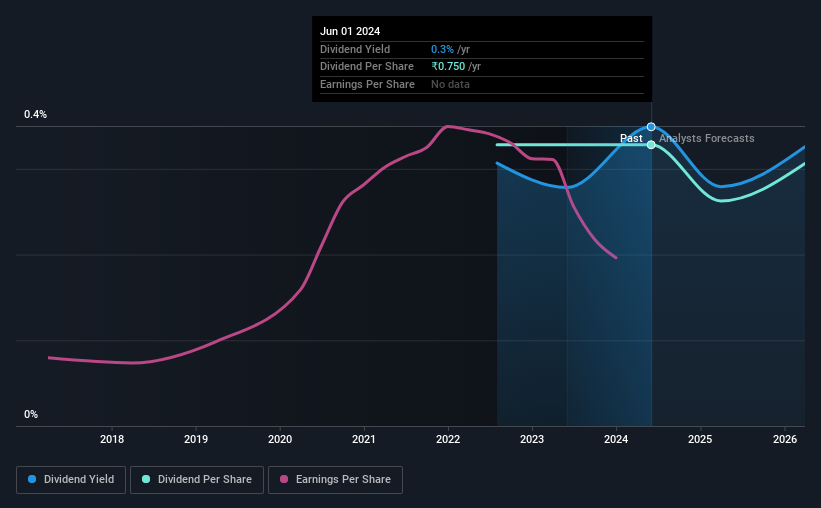
The board of India Pesticides Limited (NSE:IPL) has announced that it will pay a dividend on the 19th of September, with investors receiving ₹0.75 per share. This means the annual payment will be 0.3% of the current stock price, which is lower than the industry average.
While the dividend yield is important for income investors, it is also important to consider any large share price moves, as this will generally outweigh any gains from distributions. India Pesticides' stock price has reduced by 42% in the last 3 months, which is not ideal for investors and can explain a sharp increase in the dividend yield.
See our latest analysis for India Pesticides
India Pesticides' Payment Has Solid Earnings Coverage
Even a low dividend yield can be attractive if it is sustained for years on end. Based on the last payment, India Pesticides was earning enough to cover the dividend, but free cash flows weren't positive. In general, we consider cash flow to be more important than earnings, so we would be cautious about relying on the sustainability of this dividend.
Looking forward, earnings per share is forecast to rise by 72.1% over the next year. If the dividend continues along recent trends, we estimate the payout ratio will be 5.6%, which is in the range that makes us comfortable with the sustainability of the dividend.

India Pesticides Doesn't Have A Long Payment History
The dividend hasn't seen any major cuts in the past, but the company has only been paying a dividend for 2 years, which isn't that long in the grand scheme of things. There hasn't been much of a change in the dividend over the last 2 years. India Pesticides hasn't been paying a dividend for very long, so we wouldn't get to excited about its record of growth just yet.
The Dividend Looks Likely To Grow
The company's investors will be pleased to have been receiving dividend income for some time. India Pesticides has impressed us by growing EPS at 15% per year over the past five years. India Pesticides definitely has the potential to grow its dividend in the future with earnings on an uptrend and a low payout ratio.
In Summary
Overall, it's nice to see a consistent dividend payment, but we think that longer term, the current level of payment might be unsustainable. While the low payout ratio is a redeeming feature, this is offset by the minimal cash to cover the payments. We don't think India Pesticides is a great stock to add to your portfolio if income is your focus.
Investors generally tend to favour companies with a consistent, stable dividend policy as opposed to those operating an irregular one. Meanwhile, despite the importance of dividend payments, they are not the only factors our readers should know when assessing a company. Taking the debate a bit further, we've identified 2 warning signs for India Pesticides that investors need to be conscious of moving forward. Is India Pesticides not quite the opportunity you were looking for? Why not check out our selection of top dividend stocks.
New: AI Stock Screener & Alerts
Our new AI Stock Screener scans the market every day to uncover opportunities.
• Dividend Powerhouses (3%+ Yield)
• Undervalued Small Caps with Insider Buying
• High growth Tech and AI Companies
Or build your own from over 50 metrics.
Have feedback on this article? Concerned about the content? Get in touch with us directly. Alternatively, email editorial-team (at) simplywallst.com.
This article by Simply Wall St is general in nature. We provide commentary based on historical data and analyst forecasts only using an unbiased methodology and our articles are not intended to be financial advice. It does not constitute a recommendation to buy or sell any stock, and does not take account of your objectives, or your financial situation. We aim to bring you long-term focused analysis driven by fundamental data. Note that our analysis may not factor in the latest price-sensitive company announcements or qualitative material. Simply Wall St has no position in any stocks mentioned.
About NSEI:IPL
Flawless balance sheet second-rate dividend payer.
Similar Companies
Market Insights
Community Narratives



